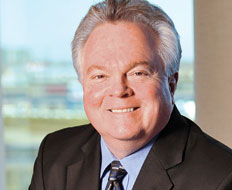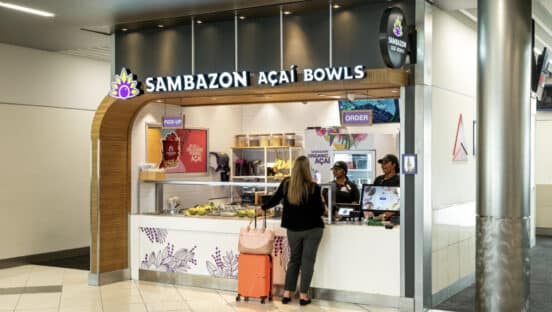International Dairy Queen Inc.’s chief operating officer, Jean Champagne, understands his franchisees’ point of view.
He comes from a large extended family of franchisees.
The COO’s Canadian parents ran a store in Niagara Falls, Ontario, for 18 years. His brother owned one in Welland, Ontario, for 13. His aunt and uncle were Dairy Queen franchisees for more than 30 years, and one of his cousins still operates units in Montreal.
If that wasn’t enough, Champagne, who is now 52 years old, spent much of his formative years during the 1970s working for his parents and at his brother’s store.
So it’s not surprising that his father’s words of wisdom that he received after his first big promotion with International Dairy Queen—“Remember where you came from”—are still important to the way he does business today. In fact, as he climbed the corporate ladder, many of his family gatherings began with conversations that involved Dairy Queen issues.
“There was discussion for about two minutes, and then my mother would shut it down,” he says. His mom insisted on keeping family time and DQ matters separate. He used her sage advice, along with much of what his dad taught him, to get where he is today.
Champagne holds one of the top executive positions at International Dairy Queen (IDQ), which includes Dairy Queen and Orange Julius concepts outside of the U.S., including Canada, Asia, and the Middle East. He reports directly to the company’s president and CEO, John Gainor.
Under Champagne’s watch, the global division is expanding ahead of schedule. He and his team plan to open their 500th location in China within the first two months of this year. That’s more than two years ahead of the previously publicized plan. Moreover, IDQ is targeted to expand to 1,000 locations outside of North America in 2012 (currently there are 935 stores), and management has set ambitious long-range goals for the concept after that target is reached.
“Our plan is to double that number” to 2,000 outlets by 2015, Champagne says. And he has a clear vision on how to get there: keeping his operators happy.
“What’s good for the franchisee is good for the franchisor,” he says in a way that makes it clear it’s not his first time proclaiming the strategy. And to ensure operators follow the parameters set by IDQ corporate, Champagne says he works hard to show them positive returns on investment. Demonstrating the numbers in black and white clearly and simply points out how intended goals work for both parties.
Being owned by Berkshire Hathaway Inc. doesn’t hurt either. The internationally known company and its CEO, Warren E. Buffett, who is reportedly the second wealthiest man on the planet, also helped IDQ reach targeted expansion plans ahead of schedule.
“It was a great boost of confidence in our brand,” Champagne says of Berkshire Hathaway’s 1998 acquisition of the quick serve. “And our franchisees were very pleased.”
Champagne works hard to keep his franchisees that way. As a rule, he makes sure to explain how spending money will benefit both the company and franchisees when he approaches operators with new promotional ideas, menu items, or remodeling requests.
“It’s not about telling, it’s about selling,” the COO says. “And it’s about listening.” Nevertheless, convincing people to do something that they don’t want to do is one of the hardest aspects of his job, he admits. But it’s easier to do so when he understands his franchisees’ concerns.
Just like his two-minute discussions at family get-togethers, it’s all about relationships for Champagne.
He points out that effective communication and developing trusted partners is especially important since IDQ competes for investment funds from franchisees around the globe. Those operators often run multiple concepts and only pick the most successful franchisors to work with.
The goal is to “make them love us more than other brands,” Champagne says. “The only way you can do that is by showing them their return on investments.”
His method, and a little of Buffett’s Midwestern charm, seem to be working in China, where the company has experienced strong growth and increasing popularity among consumers.
“We are the No. 1 ice cream brand in China,” Champagne says proudly.
A Chinese press event last year helped solidify that position and tie the Buffett name to the company. While there, Buffett allowed a child to sit on his lap as media captured the sweet image that Champagne says was completely unscripted. Buffett is also known to devour DQ sweet treats in public to encourage consumer confidence.
But the real proof is in the pudding, or in this case the soft-serve ice cream Dairy Queen is best known for.
In fact, Dairy Queen’s frozen sweet is so beloved it was copied by Chinese imitators. Champagne says that at one point he knew of five fake Dairy Queen stores that were operating in China.
“They were stealing our trademarks and recipes and they had done a pretty darn good job,” he says. The Chinese government acted swiftly to shut down the illegal copycats once Champagne’s staff discovered and reported the fake shops. But they had to navigate proper channels to get them shut down, and the process was costly and time consuming.
There’s little companies can do to prevent imitators, Champagne says, but the Chinese government is under a great deal of pressure to protect intellectual property in the country.
[pagebreak]
Still, most of the copying was done in second- and third-tier cities, rather than the larger, more populated metropolitan areas. Unfortunately, that’s also where IDQ happens to be concentrating its expansion, he says.
In the past, Dairy Queen’s primary growth was in Shanghai, Champagne says. “Now we’re seeing great success is in second- and third-tier cities because there’s less competition in those regions and people have disposable income there. They are growing at almost the same rate as major cities.
“Rent and labor is a little cheaper,” he says, but that’s balanced with the higher costs of supplying product in less-populated areas.
Throughout China, the soft-serve quick serve’s greatest competitor—by far—is KFC, which has more than 3,000 stores in the country. But like many successful leaders, Champagne learns from his competition, even those six times his size.
“Sometimes you have to take your hat off and admit they’re doing a wonderful job,” he says of Yum! Brands’ fried chicken concept. “They have great site procurements. And they’re good operators.
“They have great product quality and competitive innovation,” he says. Specifically, he points to KFC’s meal deals, which are smaller than those in North America and marketed to Chinese families. They’re smartly promoted meal bundles that include tiny treat options for kids.
“One of the things we learned,” he says, “was the importance of the mini blizzard, and it was a huge success.” The promotion was subsequently brought to the U.S., where it experienced equal popularity.
Moreover, Champagne realized that KFC was appealing to local tastes with such options as spicy chicken. That particular menu item wasn’t readily available from other U.S. chains in China, and the move gave KFC an undoubted edge in the market.
When IDQ expanded into China in 1992, leaders assumed Chinese diners would like the standard menu items—frozen soft-serve ice cream and chocolate-coated Dilly Bars.
“That’s not really true,” Champagne says. “They weren’t big chocolate lovers.”
With that and KFC’s success in mind, DQ launched menu items that were unique to the Chinese market. To date, the most successful Chinese menu item is the Green Tea Blizzard, a result of carefully studying local markets and listening to his franchisees there.
Green Tea Blizzards were so popular in the country, they were rolled out in other places such as Indonesia and the Philippines. In addition, other local menu items like the red-bean and almond-flavored shakes were introduced to rave reviews.
Those kinds of local innovations, Champagne says, were the product of not only listening, but also “being in the market.”
Champagne visits international locations often to learn from the operators, taste what they’re offering, give feedback, and meet the front-line employees. When he visits stores he follows his dad’s advice to speak to cooks on duty and shake their hands. Then he challenges them to a friendly competition to see who makes the best ice cream swirls. The COO says he usually wins.
Face-to-face interactions are so valuable to Champagne he’s even planning an international tour with his full executive team. It will include stops in Saudi Arabia and Shanghai. Next on the slate is opening a store in India. Contracts are already set to be inked for that deal, he says.
While Champagne oversees expansion outside the U.S., he points out that “the international group is still very small” compared with domestic operations. Of the 6,200 global stores, 4,600 are in the U.S. And because of the size alone, U.S. policy greatly affects worldwide systems.
“The U.S. operations drive the majority of the global strategy,” he says. Part of that strategy is reenergizing the 72-year-old concept’s image, especially at older locations that may be unchanged since they opened.
“It’s part of being the age that we are,” Champagne says, referring to outdated stores. “When you think back 72 years ago, there were things we did then that we wouldn’t do today. So we’re on a strong campaign for our franchisees to modernize their locations.”
This is particularly hard in bad economic times, and especially at the older locations that are operated by third-generation franchisees, he says. The sweet upside? Dairy Queen is a trusted brand for many in the over-50 demographic.
For example, it has helped him glide though some of his many trips at airport security checkpoints. Once some of the older guards hear what his job is, he says, they enjoy chatting about their own childhood favorite frozen treats.
And what does he say when one of those folks he meets in airports, or the many he runs into at trade meetings, cocktail parties, or even his own family functions, asks for the scoop about being a Dairy Queen franchisee?
He has a pragmatic answer that he quickly rattles off: “I say, ‘it’s a great business, but do your due diligence.’”







